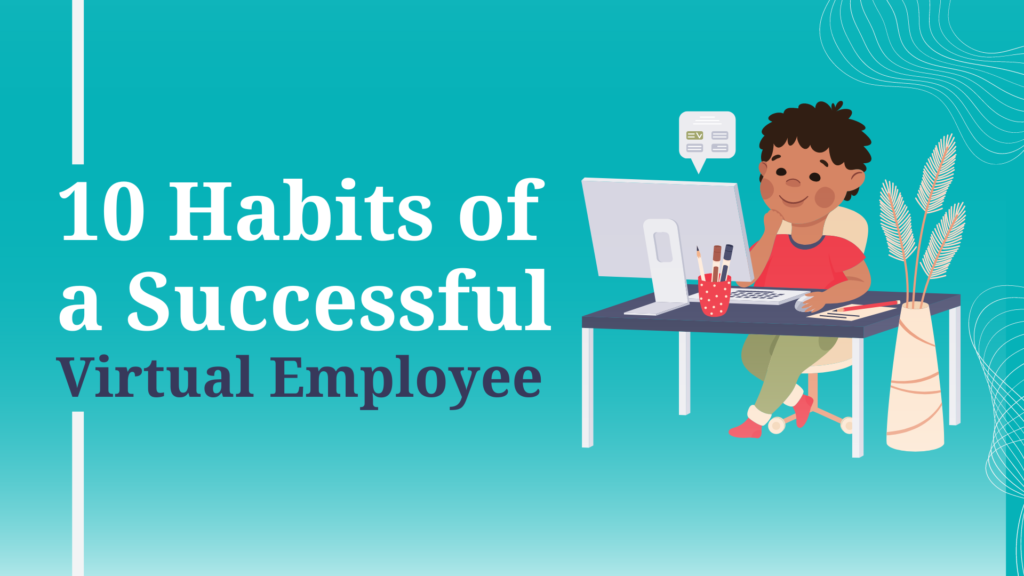In today’s digital world, remote work has become the norm for many professionals. While the job does offer convenience and flexibility, it also requires a different attitude to thrive. Be it a fresher trying his hand at remote work or an experienced one, building the right habits will make a big difference in productivity and job satisfaction. Here are ten essential habits of a successful virtual employee:
1. Create a consistent schedule
The key to making it work in a virtual office is consistency. Keep a routine daily schedule with breaks throughout the day and at a specific end time every day. Start your work at the same time each day. Maintain a clear separation between work and personal life through routines for better productivity and preventing burnout.
2. Create a dedicated workstation
Staying focused and organized requires having a dedicated workspace. Choose one room in your home which would contain all equipment needed and where you wouldn’t get distracted. A specific workspace not only allows you to be more productive but also signals your brain when it’s time to work, helping you switch into more productive activities.
3. Set clear goals and priorities
Effective remote workers prioritize their tasks and set actionable goals. To keep track of your objectives, use tools like digital planning, project management software, and to-do lists. To stay on track, divide difficult activities into smaller, more doable ones and regularly assess your progress.
4. Actively communicate
It’s critical to communicate in a remote work setting. Communicate with your colleagues on a regular basis, share updates on your work, and ask for their feedback when needed. To stay in touch with coworkers, use a range of communication options, such as email, messaging applications, and video calls. Early communication guarantees that everyone is in agreement with the project’s objectives and helps to establish confidence.
5. Embrace technology
Boost productivity and simplify corporate procedures with the help of technology. Determine the software and tools that your team uses, including file-sharing services, back-end apps, and collaboration tools. Keeping up with the most recent development in technology can also provide you an advantage and increase the effectiveness of remote work.
6. Use a timeline
In the absence of a physical office environment, time management becomes even more important. Use techniques like the Pomodoro Technique or time blocking to better manage your workday. Prioritize tasks based on deadline and priority, and avoid multitasking to maintain top performance.
7. Keep a work-life balance
Balancing work and personal life is one of the challenges of remote work. Define and stick to work hours and set boundaries. Avoid working after these hours, and make time for personal activities and rest. Establishing a clear separation between work and personal life helps prevent burnout and keeps you motivated.
8. Keep planning
An unorganized workplace can be stressful. Organize both your physical and digital workspaces by routinely keeping and arranging your files. Organize your workspace using labels, calendars, and folders to stay on top of deadlines and crucial paperwork. Your ability to stay focused and productive is enhanced by the organized setting.
9. Participate in continuing learning
It takes adaptability and a willingness to learn to work remotely. Keep up with changes in the field and keep an eye out for chances to advance your career. Investing in your skills and knowledge, whether via webinars, online courses, or reading articles about the sector, keeps you up to date and prepared for new challenges.
10. Give someone a positive attitude
Success in every field requires a positive outlook, and working remotely is no different. Accept the adjustments that come with working remotely and concentrate on its advantages. In addition to increasing productivity, positive thinking enhances team collaboration, which promotes harmony in a remote work setting.
Conclusion
Success as a virtual employee involves more than just working from home;you also need to be disciplined, organized, and able to communicate well. You may improve team support, maintain a good work-life balance, and boost productivity by implementing these ten practices. If you follow these guidelines, your performance in the remote office will improve.


